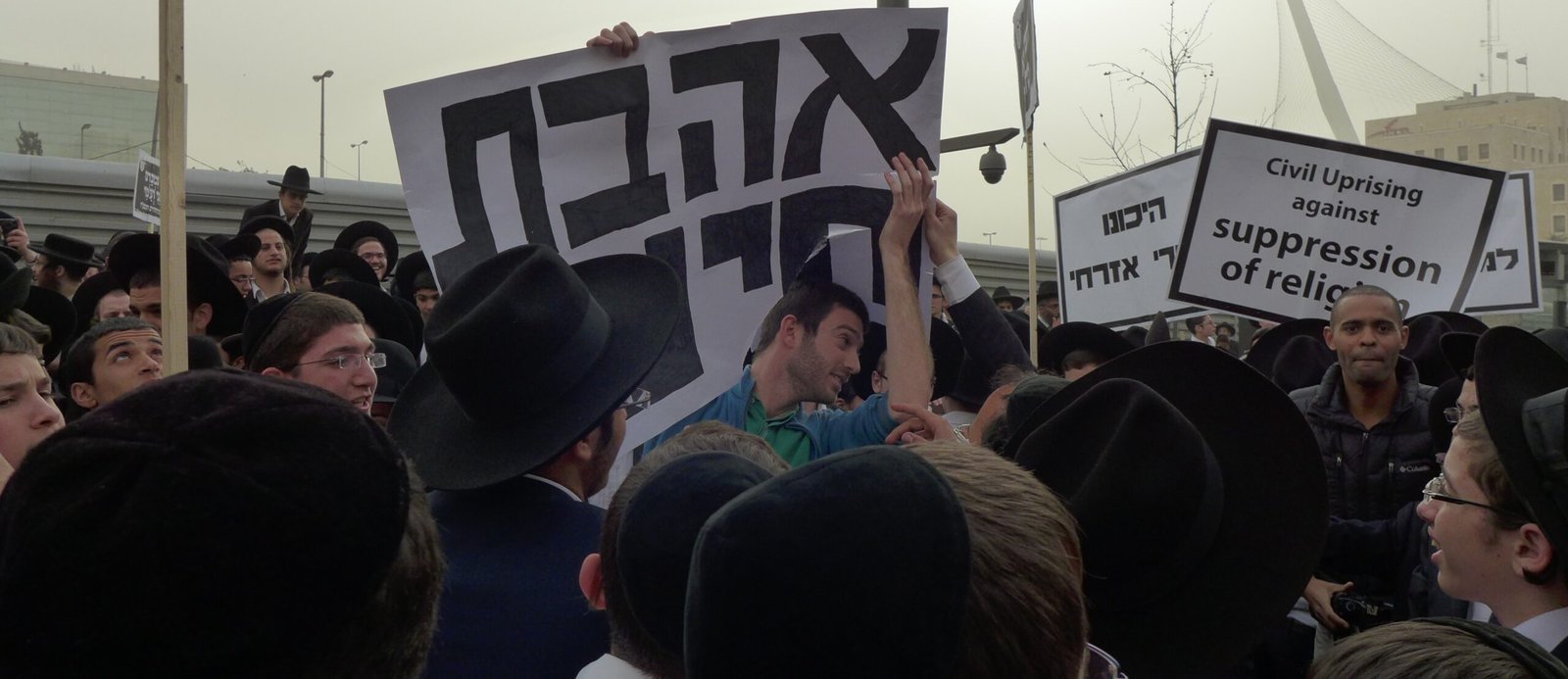Share This Story, Choose Your Platform!
The first step to happiness is a clear “No!” – a “no!” to “the counsel of the wicked”, a “no!” to “the way of sinners” and a “no!” to “the seat of the scoffers”. However, turning away from evil alone does not make anybody happy. Those who live by the motto “I do not do anything bad” will never reach the goal set by the Creator.
Only the doing of good brings real luck. The classic Jewish commentators keep coming back to saying that Psalms 2:1 corresponds to the statement of Psalms 34:15: “Turn away from evil and do good. Seek peace and pursue it.” They never tire of emphasizing: “He who avoids evil only but does not do good has not completed his work. He cannot be praised as blessed.” As Paul writes, “Detest the evil. Chase after the good” (Romans 12:9).
Therefore the logical question arises: What is the good to be done? – Psalms 1:2 answers this question:
“Rather his delight is in the Torah of the Lord.” – In traditional Bible translations, “the pious” is delighted in the “law of the Lord” and meditates on “the law” day and night.
Already the ancient Jewish translation of the Hebrew Bible into Greek, the so-called Septuagint (LXX), renders “בְּתֹורַת יְהוָה/BeTorat Adonai” with “ἐν τῷ νόμῳ κυρίου/en to nomo kyriou” (in the law of the Lord). Similarly, Jerome in Bethlehem translated in the fourth century in the “Vulgata,” the “popular,” that is, the generally used Latin Bible, “in lege Domini.” In this respect, our Bible translations represent an ancient Jewish-Christian tradition.
However, the rendering of the Hebrew word “תורה/torah” with “law”[1] is misleading because of how we understand the word “law” today. Especially Jews and some modern translators of the Bible into German feel this.[2] And “anyone who talks to Jews about this will first hear that תורה [torah] does not mean ‘law’ but instruction.”[3]
The meaning of the word “Torah”
The root of “תורה/torah” is “ירה/yarah”, which basically means “to throw” or “to shoot”, that is, “sending a projectile into a target”. From this, the meaning will then continue “to focus on a goal” – and in a figurative sense “to direct,” “to instruct,” “to teach.”
“Therefore, a Moræh is both a teacher and a guide in the landscape. In Israel there is even a ‘signpost hill’ [Giv’at HaMoreh], a small elevation near Afula in the Jezreel plain, which owes its name to the fact that in ancient times caravans coming from the Mediterranean had to decide at this hill, whether they were to turn north and from there via Damascus to the Euphrates, or south through the Jordan Valley past the Dead Sea to the Gulf of Aqaba on the Red Sea.”[4]
Job 38:6 uses the root “ירה/yarah” to describe that a cornerstone is being “laid”. The foundation stone determines the orientation of a built-up structure. It is the “torah” of a building.
Paul may have had this image in mind when he spoke of “Messiah Yeshua being the cornerstone”[5] and that “no one can lay another foundation except the one who is laid” (1 Corinthians 3:11). Yeshua determines the direction to His church.
So “תורה/torah” is all about a “מורה/moreh” (= teacher, derived from the same root “ירה/yarah”) giving a certain direction to his disciple. The teacher focuses his student on the goal, so that what the student will say and live “hits the bullseye”.
Anyone who misses the target, that is, misses the objective, is a “sinner” in biblical terms. “Sin” means “missing a goal”. This applies both to the Hebrew root “חטא/chata’” as well as to “ἁμαρτάνειν/hamartanein” used in the Greek New Testament.
When a shot is missed, it doesn’t matter how well-meaning the shooter was, or how much he trained, or whether he theoretically knew how to shoot. It is only important that the projectile hits the target. The Torah prevents the shooter from missing the target by re-focusing him on the objective.
In this respect, “the law” in Galatians 3:24 is first and foremost to be understood as something positive: The Torah is the educator who focuses us on the Messiah, “that we may be justified by faith.”
August Dächsel[6] hit the nail on the head (as the German saying goes) by describing Psalm 1 “as a kind of preface to the whole book of Psalms in general”, “concentrating its entire teaching and exhortation into one brief summary… putting right at the threshold in the reader’s mind: ‘To which goal human actions must be aligned like arrows.’”[7]
The “Torah of the Lord” is the alternative to the “council of the evil ones”, “the way of the sinners” and “the seat of the scoffers”, all of which are absolutely sure means to miss the target. Rashi[8] explains, that “the seat of the scoffers” ultimately “leads to the dissolution of the Torah”. Our text emphasizes: Those who ignore the Torah of the Lord or consciously turn away from it will get caught up in the web of sin. They will miss the purpose and goal of their life. On the other hand, anyone who occupies himself with the Torah of the Lord, will remove himself from sin in every respect.[9]
The contemporary German theologian Hans Maaß states: “Signpost! This is what the Torah wants to be. Not a law with a threat of punishment, but a directive to a successful life in harmony with the creative order of God. However, this also has the consequence: if you do not follow this directive, you are going astray; this, however, is not punishment but consequence.”[10]
Delight in the law
Amos Hakham[11] observes: “The term ‘his liking’ (חֶ֫פְצֹ֥ו/cheftzo) carries within itself the meaning of desire and yearning. That is, the righteous yearns for and desires the word of God.”[12]
Rabbi Hirsch[13] explains, that in the Hebrew language the word “חפץ/chefetz” (= desire, longing) is an intensified “חפש/chapes” (= search).[14] Even those who do not know Hebrew may see that the two words “חפץ/chefetz” and “חפש/chapes” (in Hebrew read from the right!) differ only in the last letter.
That is, whoever finds “his delight” in the Torah, seeks it with all his strength, strives after it with all available possibilities. He is totally focused on the Torah.
Martin Luther agrees with this view. He states, “He who loves the law of God is blessed.”[15] Luther also knows that such a basic attitude is of consequence in daily life, “for where love goes, there follow both the heart and the body.”
The British theologian Derek Kidner comments: “The mind… is treated as the key to the whole man… whatever really shapes a man’s thinking shapes his life.”[16] Luther concludes: “Blessed is he who is gifted with this heavenly desire”.[17]
Fight for the Torah
However, Luther then realistically concludes that what the psalmist here says “goes against the minds of all people, especially the wise.”[18] “The pleasure to the law of the Lord, is neither planted nor innate to human nature, but must come down from heaven… Now, this desire and love, we have to implore for ourselves, who despair of our strength and ability, from heaven”.[19]
To enjoy the Torah of the Lord is often a struggle. This is true even for someone who has tasted “how good, lovely, pure, holy, wonderful the word of God is, the highest possession which those can never taste, who are in the law only with their hand or with their tongue, but with their will they are sinking into the feces of [earthly] things.”[20]
A crucial help in the struggle for the joy of the law is that we distinguish between the Word of God and human ideas. Also in this regard, Martin Luther had a clear view, which is highly up-to-date: “Be careful (I say this once and for all) that you distinguish, the law of the Lord, as clearly and sharply from the laws of any man and pay attention with all diligence not to mix both [laws] in one desolate heap, to miserably ruin you, as this is done by the teachers of perdition, who either make of God’s law human statutes, or declare the statutes of men to be a law of God.”[21]
It is crucial that we rediscover the power of the original Word of God. Often it is the commandments of men and religious customs that deter people, while God’s Torah is indeed life[22] and breathtakingly attractive.
Michael Green, professor of evangelism at Regent College in Vancouver in the late 1980s, imparted to us with regard to evangelistic conversations the following advice: “Give the word of God a chance to show its power. Stop selling your own experiences, ideas, beliefs, theological insights, or biblical knowledge – simply let the Word of God speak.”
If God actually speaks, none of His creatures can remain uninterested, unless blind, deaf, or otherwise severely handicapped. The “delight in the Torah” is actually a matter of course.
Footnotes:
[1] As do King James, NIV, NASB, NAS, ESV and Luther, Elberfelder, Menge, in German as “Gesetz” or in Czech “zákon“ (Kralitzer and the Ecumenical Translation). They all follow the Septuagint that translates “תורה/torah” as “νόμος/nomos”, or the Vulgate where it is rendered “lex”.
[2] The catholic Einheitsübersetzung and Karl-Heinz Vanheiden (KHV), representing the German brethren movement, speak like Martin Buber of “instruction”, or KHV the second time simply as “Word [of God]”. The German Jewish translators Samson Raphael Hirsch and Leopold Zunz render it as “teaching”. The modern German translation Gute Nachricht translates in Psalms 1:2 once “instruction”, once “law”.
[3] Hans Maaß on December 9, 2018 to Psalm 1 in an e-mail to his personal circle of friends.
[4] Hans Maaß on December 9, 2018 to Psalm 1 in an e-mail to his personal circle of friends.
[5] Ephesians 2:20; compare Matthew 21:42; Mark 12:10; Luke 20:17; Acts 4:11; 1 Peter 2:6‑7 referring to Isaiah 28:16 and Psalms 118:22.
[6] Karl August Dächsel (1818-1901) was a Protestant theologian, who came from Naumburg an der Saale. He was related to the philosopher Friedrich Nietzsche and the poet Gotthold Ephraim Lessing. After studying theology in Leipzig, Halle and Magdeburg and a time as a tutor, he was Lutheran pastor in Hirschfeld / Prussia, Hohenbocka / Lower Silesia, Neusalz an der Oder and Steinkirche (diocese Strehlen). August Dächsel became known for his seven-volume practical-scientific interpretation of the entire Bible, which was colloquially called “Dächsel’s Bible Work” and shaped many Christians beyond his time in German-speaking Europe.
[7] August Dächsel, Die Lehrbücher Hiob, Psalter, Sprüche, Prediger und Hohelied Salomonis, Das Alte Testament mit in den Text eingeschalteter Auslegung, ausführlichen Inhaltsangaben und erläuternden Bemerkungen III (Leipzig: Verlag von Justus Naumann, 2. Auflage 1876), 131.
[8] Rabbi Shlomo Ben Yitzchak (1040-1105) or “Rabbi Shlomo Itzchaki,” commonly called “Rashi,” was born in the northern French town of Troyes, studied for ten years in Mainz and Worms, before he returned to Troyes, where he distinguished himself as a judge and teacher. In his last years he witnessed the persecution of Jews during the Crusades. Rashi is one of the extraordinary interpreters of Jewish writings and the very first who explained the Bible and the Talmud comprehensively. His basic concerns were to bring Holy Scripture to the people, to promote the unity of the Jewish people and the theological confrontation with Christianity. Raschi made a sharp distinction between “pshat” (literal interpretation) and “drash” (allegorical interpretation), whereby the pshat gives the rash. His interpretation of Scripture has decisively shaped the reformer Martin Luther. Although his comments are still standard today, he often writes “I do not know”.
[9] עמוס חכם, ספר תהלים, ספרים א-ב, מזמורים א-עב (ירושלים: הוצאת מוסד הרב קוק, הדפסה שביעית תש”ן/1990), ה.
[10] Hans Maaß on December 9, 2018 to Psalm 1 in an e-mail to his personal circle of friends.
[11] (1921-2012) became known in Israel as champion of the first Israeli and worldwide Bible quiz. His handicapped father, Noah Hakham, was a Jewish Bible teacher who had moved from Vienna to Jerusalem in 1913. He had not sent the only son to a public school for fear of a speech impediment. Rather, he himself had trained him in extremely poor conditions. The Bible quiz in August 1958 revealed Amos’ genius and established his legendary career as interpreter of Scripture. His expositions are only available to me in Hebrew.
[12] עמוס חכם, ספר תהלים, ספרים א-ב, מזמורים א-עב (ירושלים: הוצאת מוסד הרב קוק, הדפסה שביעית תש”ן/1990), ד.
[13] Samson Raphael Hirsch (1808-1888) came from Hamburg and served as Chief Rabbi in Oldenburg, Aurich, Osnabrück, Moravia and Austrian Silesia. As a distinguished representative of Orthodoxy, he was an outspoken opponent of reformist and conservative Judaism. Hirsch attached great importance to the study of all Scripture. From 1851 he was rabbi of the separatist Orthodox „Israelitischen Religions-Gesellschaft“ (“Israelite Religious Society”), engaged in education and published the monthly magazine “Jeschurun”. Hirsch had a great love for the land of Israel, was at the same time, however, an opponent of the proto-Zionist activities of Zvi Hirsch Kalischer. He is seen as one of the founding fathers of the neo-orthodox movement.
[14] Samson Raphael Hirsch, Psalmen (Basel: Verlag Morascha, 2. Neubearbeitete Auflage 2005), 3.
[15] Johann Georg Walch (hg.), Dr. Martin Luthers Sämtliche Schriften. Vierter Band. Auslegung des Alten Testaments (Fortsetzung). Auslegung über die Psalmen (Groß Oesingen: Verlag der Lutherischen Buchhandlung Heinrich Harms, 2. Auflage, 1880-1910), 221.
[16] Derek Kidner, Psalms 1-72. An Introduction & Commentary, TOTC (Leicester/England and Downers Grove, Illinois/USA: Inter-Varsity, 1973), 48.
[17] Johann Georg Walch (hg.), Dr. Martin Luthers Sämtliche Schriften. Vierter Band. Auslegung des Alten Testaments (Fortsetzung). Auslegung über die Psalmen (Groß Oesingen: Verlag der Lutherischen Buchhandlung Heinrich Harms, 2. Auflage, 1880-1910), 234.
[18] Johann Georg Walch (hg.), Dr. Martin Luthers Sämtliche Schriften. Vierter Band. Auslegung des Alten Testaments (Fortsetzung). Auslegung über die Psalmen (Groß Oesingen: Verlag der Lutherischen Buchhandlung Heinrich Harms, 2. Auflage, 1880-1910), 221.
[19] Charles Haddon Spurgeon, Die Schatzkammer Davids. Eine Auslegung der Psalmen von C. H. Spurgeon. In Verbindung mit mehreren Theologen deutsch bearbeitet von James Millard. I. Band (Wuppertal und Kassel/Bielefeld: Oncken Verlag/Christliche Literatur-Verbreitung, 1996), 10.
[20] Johann Georg Walch (hg.), Dr. Martin Luthers Sämtliche Schriften. Vierter Band. Auslegung des Alten Testaments (Fortsetzung). Auslegung über die Psalmen (Groß Oesingen: Verlag der Lutherischen Buchhandlung Heinrich Harms, 2. Auflage, 1880-1910), 234.
[21] Johann Georg Walch (hg.), Dr. Martin Luthers Sämtliche Schriften. Vierter Band. Auslegung des Alten Testaments (Fortsetzung). Auslegung über die Psalmen (Groß Oesingen: Verlag der Lutherischen Buchhandlung Heinrich Harms, 2. Auflage, 1880-1910), 230.
[22] Deuteronomy 32:47; Proverbs 4:4; John 5:24; 6:63,68; Acts 5:20; 7:38; Philippians 2:16.






















